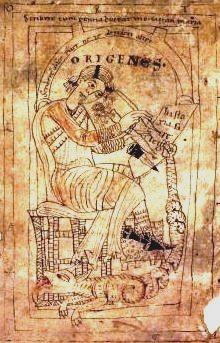Potvrdené výroky
Zdroj: [TORKINGTON, David.: Modlitbou k radosti. Bratislava: LÚČ, 2004 ISBN 80-7114-458-4]
Origenes citáty a výroky
Origenes: Citáty v angličtine
“How divine scripture should be interpreted,” On First Principles, book 4, chapter 2, § 2, Readings in World Christian History (2013), p. 69
On First Principles
Kontext: The reason why all those we have mentioned hold false opinions and make impious or ignorant assertions about God appears to be nothing else but this, that scripture is not understood in its spiritual sense, but is interpreted according to the bare letter.
“God is incomprehensible, and incapable of being measured.”
On First Principles, Bk. 1, ch. 1; par. 5
On First Principles
Kontext: Having refuted, then, as well as we could, every notion which might suggest that we were to think of God as in any degree corporeal, we go on to say that, according to strict truth, God is incomprehensible, and incapable of being measured. For whatever be the knowledge which we are able to obtain of God, either by perception or reflection, we must of necessity believe that He is by many degrees far better than what we perceive Him to be.
Against Celsus, Bk. 6, ch. 79; vol. 2, p. 422.
Against Celsus
Kontext: There was no need that there should everywhere exist many bodies, and many spirits like Jesus, in order that the whole world of men might be enlightened by the Word of God. For the one Word was enough, having arisen as the "Sun of righteousness (Malachi chpt. 3)," to send forth from Judea His coming rays into the soul of all who were willing to receive Him. But if any one desires to see many bodies filled with a divine Spirit, similar to the one Christ, ministering to the salvation of men everywhere, let him take note of those who teach the gospel of Jesus in all lands in soundness of doctrine and uprightness of life, and who are themselves termed "christs" by the Holy Scriptures, in the passage, "Touch not mine anointed, and do not my prophets any harm." For as we have heard that Antichrist cometh, and yet have learned that there are many antichrists in the world, in the same way, knowing that Christ has come, we see that, owing to Him, there are many christs in the world, who, like Him, have loved righteousness and hated iniquity, and therefore God, the God of Christ, anointed them also with the "oil of gladness." But inasmuch as He loved righteousness and hated iniquity above those who were His partners, He also obtained the first-fruits of His anointing, and, if we must so term it, the entire unction of the oil of gladness; while they who were His partners shared also in His unction, in proportion to their individual capacity.
On First Principles, Bk. 1, ch. 6; par. 1
On First Principles
Kontext: An end or consummation would seem to be an indication of the perfection and completion of things.... These subjects, indeed, are treated by us with great solicitude and caution, in the manner rather of an investigation and discussion, than in that of fixed and certain decision.... We think, indeed, that the goodness of God, through His Christ, may recall all His creatures to one end, even His enemies being conquered and subdued. For thus says holy Scripture, “The LORD said to My Lord, Sit Thou at My right hand, until I make Thine enemies Thy footstool.” (Psalm 110:1) And if the meaning of the prophet’s language here be less clear, we may ascertain it from the Apostle Paul, who speaks more openly, thus: “For Christ must reign until He has put all enemies under His feet.” (1 Cor 15:25) But if even that unreserved declaration of the apostle do not sufficiently inform us what is meant by “enemies being placed under His feet,” listen to what he says in the following words, “For all things must be put under Him.” (1 Cor 15:27) What, then, is this “putting under” by which all things must be made subject to Christ? I am of opinion that it is this very subjection by which we also wish to be subject to Him, by which the apostles also were subject, and all the saints who have been followers of Christ. For the name “subjection,” by which we are subject to Christ, indicates that the salvation which proceeds from Him belongs to His subjects, agreeably to the declaration of David, “Shall not my soul be subject unto God? From Him cometh my salvation.” (Psalm 62:1)
On First Principles, Bk. 1, ch. 2; par. 11
On First Principles
“How divine scripture should be interpreted,” On First Principles, book 4, chapter 2, Readings in World Christian History (2013), p. 75
On First Principles
On First Principles, Bk. 4, ch. 2, par. 15
On First Principles
On First Principles, Bk. 1, ch. 5; vol. 1, p. 45.
On First Principles
“How divine scripture should be interpreted,” On First Principles, book 4, chapter 2, Readings in World Christian History (2013), p. 70
On First Principles
“How divine scripture should be interpreted,” On First Principles, book 4, chapter 2, § 2, Readings in World Christian History (2013), p. 69
On First Principles
On First Principles, Bk. 1, ch. 3; par. 8
On First Principles
On First Principles, Bk. 2, ch. 11; vol. 1, p. 148
On First Principles
On First Principles, Bk. 4, ch. 2, par 16
On First Principles
